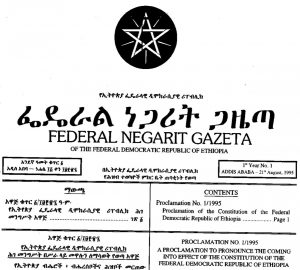Interpreting and Applying the Ethiopian Constitution During the Covid-19 Pandemic (Part II – Constitutional Interpretation)
Interpreting and Applying the Ethiopian Constitution During the Covid-19 Pandemic (Part II – (Constitutional Interpretation)

Interpreting and Applying the Ethiopian Constitution During the Covid-19 Pandemic (Part II – (Constitutional Interpretation)
A strict observance of the written law is doubtless one of the high duties of a good citizen, but it is not the highest. The laws of necessity, of self-preservation, of saving our country when in danger, are of higher obligation. To lose our country by a scrupulous adherence to the written law, would be to lose the law itself, with life, liberty, property and all those who are enjoying them with us; thus absurdly sacrificing the ends to the means. — Third U.S. President Thomas Jefferson, Letter, 1810.
Author’s Note: On May 18, 2020, I had an opportunity to make a virtual appearance (in Amharic, begins at minute 36:17- 1:22) before the Ethiopian Constitutional Inquiry Council and share my views on issues related to the postponement of the August 2020 national and regional elections because of the Covid-19 crisis. In Part I of my commentary, I sought to amplify on my testimony on before the Council by providing my readers a brief discussion on constitutionalism and Ethiopia’s constitutional history. In Part II below, I aim to discuss approaches and methods to constitutional interpretation from the viewpoint of American constitutional jurisprudence and legal scholarship. I hope those interpreting the Ethiopian Constitution will find the discussion and references below useful and informative.
Constitutional interpretation
Unlike the United States, Ethiopia does not have a long legal tradition of constitutional interpretation informed by legal precedents, doctrines and standards. Of course, the U.S. Constitution is over 230 years old and Ethiopia’s barely 30. Although the U.S. Constitution is silent on which branch of national government is responsible for constitutional interpretation, and Ethiopia’s very explicitly so (Art. 84), the U.S. Supreme Court in 1803 decided that the sole power of judicial review and authoritative interpret and apply the Constitution. Undoubtedly, that decision is singularly responsible for the constitutional viability of the U.S. government today.
The U.S. Constitution has 7 articles and contains 7,591 including the 27 amendments. The Constitution’s “phrasing is broad and the limitations of its provisions are not clearly marked. Its majestic generalities and ennobling pronouncements are both luminous and obscure. This ambiguity of course calls forth interpretation, the interaction of reader and text…” Simply stated, the U.S. government has been operating for over 230 years guided by less than 7,600 words. These words continue to guide and operate the U.S. Government through an ongoing process of judicial interpretation and re-interpretation.
The 1995 Ethiopian Constitution has 106 articles and contains over 13 thousand words. It covers a wide range of topics. Unlike the U.S. Constitution, the Ethiopian Constitution clearly delegates the ultimate power of constitutional interpretation to the House of Federation (HoF) (see Articles 62(1); 83(1); 84(1)) with investigative powers granted to Council of Constitutional Inquiry. Over the past decades, the HoF has been engaged in “investigating questions of constitutional interpretation from various individuals and sections of the society.”
Unlike the HoF, the U.S. Supreme Court has decided thousands of constitutional cases which serve as controlling authority in the interpretation and application of constitutional language in criminal, civil and administrative cases. The U.S. Supreme Court has developed constitutional tests, standards, and doctrines to streamline constitutional interpretation. For instance, in reviewing the constitutionality of ordinary legislation, the Court uses the “rational basis” test, which means a law will be upheld as constitutional so long as it is rationally related to a legitimate government interest. The “strict scrutiny” test, the most stringent test of constitutionality, is applied in cases involving fundamental rights. For instance, a law the infringes on free speech will be declared unconstitutional unless the government can show a compelling state interest for enacting the law and demonstrates that it is narrowly tailored to address the underlying problems and used the least restrictive means to achieve its purpose.
Perhaps the most important aspect of the U.S. constitution is the fact that nearly every aspect of it is open to interpretation. For instance, under Article I, section 8, the U.S. Congress is given all sorts of powers including the power to “regulate commerce”, “tax” and “borrow”, “declare war” etc. But the Constitution, beyond mentioning these powers offers no indication of their meaning or scope of application. Could Congress use the commerce clause to effectively outlaw discrimination in public accommodations such as hotels? Indeed, by interpreting the commerce clause the Court ruled Congress could regulate private discrimination if it affects interstate commerce.
Beneficial uses of American constitutional interpretive approaches in advancing Ethiopian constitutional law
Ethiopia has yet to developed a legal tradition of constitutional interpretation but can learn from the American legal and scholarly tradition of constitutional interpretation. Examining U.S. Supreme Court precedents, scholars have classified styles of constitutional interpretation based on historical periods. Such classification includes “Natural Law”, “Formalism”, “Holmesian and “Instrumentalism”.
In the long history of the U.S. Constitution, many interpretive approaches have been proposed. In general, it could be said there are five major approaches that have informed much of the interpretation of the U.S. Constitution.
The first is “textualism” which aims to ascertain the plain and objective meaning of a constitutional text. How did the drafters and the people who ratified the Constitution understood the words written in the constitution within the context of their particular social, political, and historical circumstances? The aim of textual constitutional interpretation is to give effect to the plain meaning of the written words, and if there is ambiguity, to resolve it in a manner that enhances the viability of the constitution.
Second, there are those who consider themselves “originalists” and argue that the best way to understand and interpret the constitution is by deciphering the original intentions of the drafters. They seek to reconstruct the original intended meanings of textual language by examining the texts of the debates in the Constitutional convention and the venerable Federalist Papers. They believe the task of interpreters, particularly judges, is to reconstruct the original meaning of the text of the constitution and give effect to it as the drafter would have done so were they alive today. A well-known proponent of originalism argued, constitutional interpretation should be based on “what the public of that time would have understood the words to mean.”
Third, the American legal system relies heavily on precedents (decisions of the U.S. Supreme Court and other federal courts) that have controlling authority in legal and constitutional interpretation. It is based on the principle of stare decisis which requires cases that raise similar questions should be decided in the same way. For instance, on May 28, 2020, President Donald Trump signed an executive order preventing “online censorship.” He claimed certain social media platforms are operating in a “fundamentally un-American and anti-democratic” manner. There are hundreds of Supreme Court decisions which invalidate Trump’s executive order to censor social media platforms in addition to explicit legislative protections provided to such platforms against the types of actions taken by Trump. Precedents are important in constitutional interpretation because they provide stability and consistency in the way the constitution is interpreted and applied.
Fourth, there is the approach of pragmatism, which is not overly concerned with words, phrases and intentions but takes into practical consideration the likely effect of constitutional outcomes. In this approach, the courts evaluate the consequences of their interpretations and decisions and the benefits and costs on the society. This approach is best exemplified by the observation of a famous Supreme Court justice: “The life of the law has not been logic; it has been experience.” Pragmatists look beyond the bare words and phrases to the purposes of the constitution and real life experiences to decide issues and to maximize benefits and minimize costs to society.
Fifth, the structuralist approach seeks interpretive meaning not from slicing and dicing words and phrases or divining the intentions of long dead constitutional drafters. Proponents of structuralism consider the entire text of the constitution rather than words, phrases, clauses and sections in isolation. If there are vague or ambiguous provisions, they seek to frame them within the larger constitutional context and produce a balanced interpretation. By reading particular aspects of the constitution in light of the whole document, they are more likely to resolve textual vagueness or ambiguities. Indeed, by examining constitutional issues within the totality of the constitutional text, structuralists can properly understand clauses, phrases and words and their implications more meaningfully and substantively.
American President Thomas Jefferson observed strict observance of the written law is one of the high duties of good citizenship, but not the highest. Indeed, protecting and preserving the interests of national survival and security in the face of an existential threat is of paramount importance. Ultimately, in times of danger and during a state of emergency, our highest moral and legal obligation is to SAVE OUR COUNTRY.
To lose sight of this most solemn obligation by quibbling unscrupulously over words and phrases would not only lead to losing the Constitution itself but also the lives of millions of innocent citizens who deserve better from those who claim to represent and speak for them.
Part III- How best to interpret the Ethiopia’s Constitution in light of issues raised by the COVID-19 pandemic.




